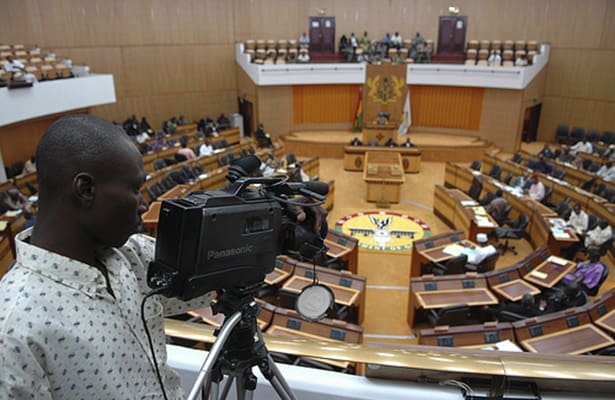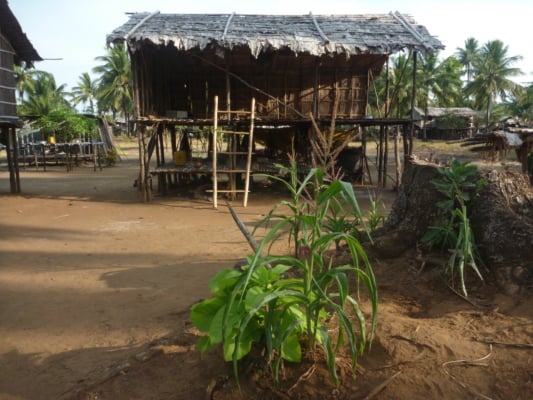Image: Photo of lawmakers meeting during a session of Parliament in Accra, courtesy of the World Bank Photo Collection via Flickr.
Guest post for ODI’s Shaping Policy for Development blog.
Last month the UK House of Commons International Development Committee (IDC) published the findings from its inquiry into parliamentary strengthening. The question of how parliaments can become more effective has never been more urgent. Almost 90% of countries today are formal democracies, but parliaments (along with political parties) are the institutions people trust least.
What the report got right
The report has a lot to commend it. Its main findings reflect consensus on the principles of better parliamentary support that have emerged over the past three decades. These run from understanding parliamentary strengthening as a long-term process and ensuring reform comes from within, to promoting better south-south exchange of knowledge.
The report calls on the UK Department for International Development (DFID) to put parliaments at the heart of its governance work and to bring other strands of the democracy assistance agenda, including political parties and the media, closer together. It also suggests that DFID should work more with parliamentary committees on issues of particular interest or concern, such as health and education, which could help build bridges between sectoral and governance work within the agency, and make the importance of parliament more tangible in the public’s mind at the country level.
The IDC also notes that DFID has been striving to take the politics of development seriously in its work, which calls for a way of engaging that is less technocratic and risk averse. In line with our report on parliamentary strengthening, the Committee recognises that DFID’s own incentives and commissioning practices are often an obstacle to the application of these principles.
This is all very welcome. And yet the IDC often fails to move beyond headline messages to engage more substantially with what all this means in practice – which really is where the challenge of development now lies. The report falls short in three areas in particular.
How politics affects the way parliaments function
Stating that ‘politics matters’ is one thing, but the report does not reflect on how and why politics matter and what working in a more politically aware manner might actually look like.
Power motivates all politicians, whether as a means to personal gain or public good. To achieve and hold on to power, politicians must influence and build relationships with others – other centres of power and decision-making, their leaders in parliament and beyond, peers, constituents, and voters more generally. But while the report talks about the need to understand parliaments as political institutions, it does not spell out the incentives and interest that drive parliamentarians.
A misplaced focus on the value of the ‘Westminster brand’
Crucially, how these common interests play out in different parliaments depends on the broader rules, ideas and power structures that govern society and its political institutions. However, the Committee’s report merely pits the presumed merits of Westminster-style parliamentary democracy against the alleged limitations of United States-inspired presidential systems.
The debate on parliamentarism vs presidentialism dates back to the 1990s but remains inconclusive. The report states that, according to The World Bank, countries with parliamentary forms of government are more effective in controlling corruption than those with presidential forms. But other research finds the opposite – that presidential systems tend to be less corrupt because they establish a much stronger, clearer and direct link between candidates/elected officials and voters.
It seems like the IDC has set this discussion up as straw man to emphasise the value of the ‘Westminster brand’ and call on DFID to work more on parliamentary strengthening with Westminster-based organisations rather than rely on large US organisations. And while the Committee is concerned about how DFID may be facilitating ‘the risk of a switch from a parliamentary to a less accountable, Presidential system’, only three of DFID’s 28 priority countries are parliamentary systems. Taking politics seriously means this reality must be the starting point; not a misplaced concern about whether there is some kind of formal political system that is more effective than others (and there isn’t).
Informal norms condition how formal rules work
If formal rules are important for understanding how parliamentarians behave, informal institutions and practices are just as fundamental – and condition how the former work. This is especially true in the developing world where unwritten rules, such as ‘big man’ politics, personalism, clientelism and the blurring of boundaries between the private and public purse, often dominate formal ones.
The report alludes to this but does not analyse what it implies in practice, or how external agencies can work with parliamentarians to align incentive structures in more progressive directions. The answer is not likely to be whether a system is parliamentary or presidential.
Unpacking what the headline messages mean in practice
Despite easy assumptions embedded in current ‘golden thread’ narrative, elected parliaments do not automatically act to reduce poverty, foster growth, or demand accountability, even in the most well established democracies. In fact, the way that politicians and political parties behave can often jeopardise development.
If international actors, including DFID, are to be more effective in strengthening parliaments, it is essential that they understand the underlying power dynamics and interests driving different parliamentarians – and adapt their approaches accordingly.
The IDC report has provided an important platform to engage in a more honest and grown-up conversation about what is needed. The onus is on the research and policy community to avoid falling back on pat phrases, such as ‘politics matter’, and do more to unpack what this means in practice for how things work in developing countries, how they are likely to change, and the role of aid in all this.










